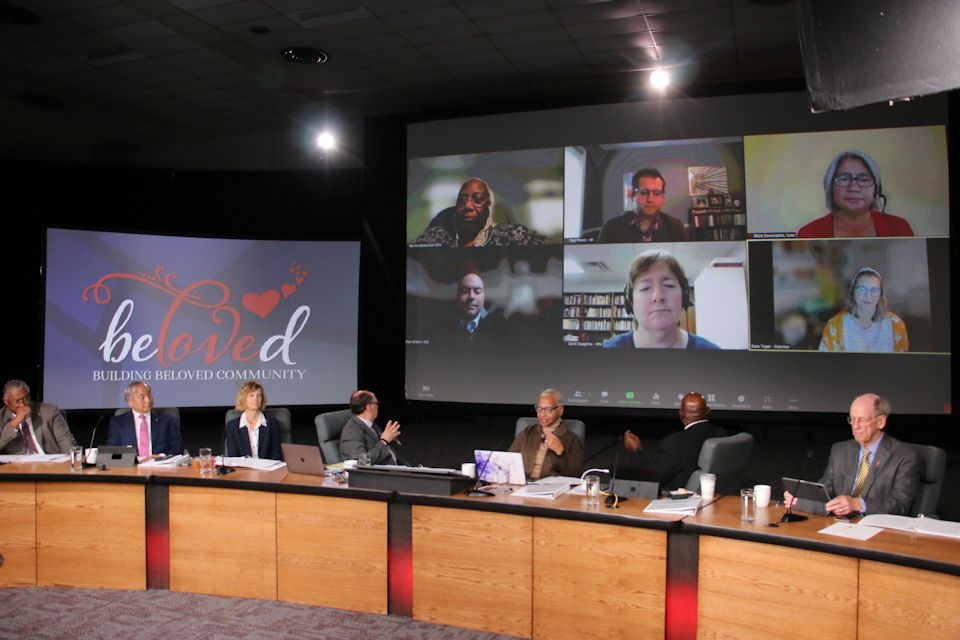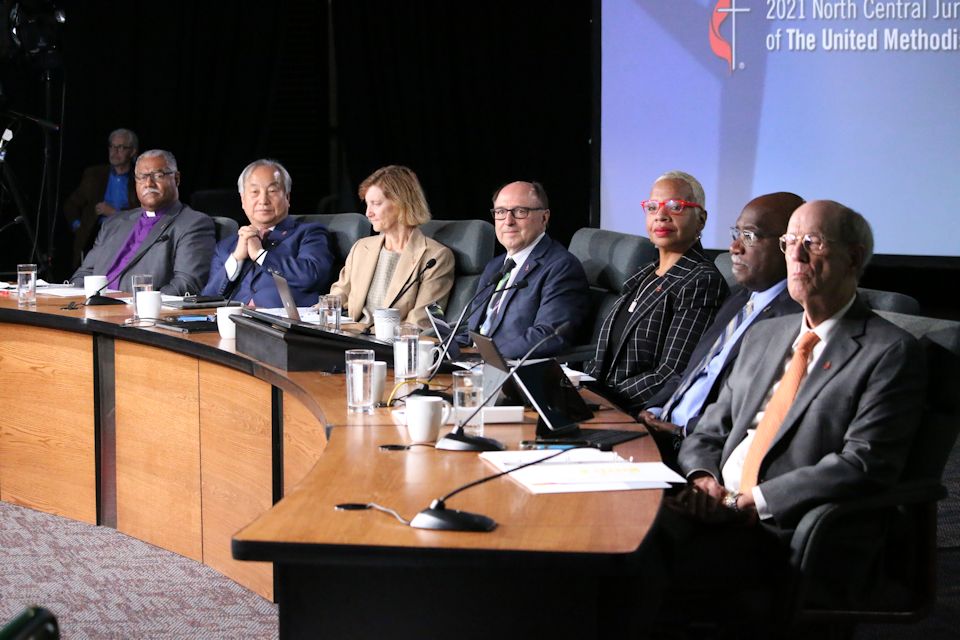Delegates of the North Central Jurisdiction met online Nov. 10-11, to name priorities and approve a “Covenant to Build Beloved Community.” They also affirmed the Bishops’ Narrative for The UMC.
CHRISTA MELAND
Director of Communications, Minnesota Conference
At a virtual North Central Jurisdictional (NCJ) Conference this week, delegates elected by their respective annual conferences created and overwhelmingly approved a covenant naming their commitment to anti-racism work and LGBTQIA+ inclusion.
Approximately 250 delegates participated in an official Zoom meeting November 10-11, 2021, hosted at the Media Center in Lansing, MI. Others from across the 10-conference jurisdiction watched it live online. Delegates spent most of their time together on three big topics of conversation—dismantling racism, the future of episcopal leadership in the jurisdiction, and the future of The United Methodist Church.
On Thursday morning, by a vote of 135-32, delegates approved a “Covenant to Build BeLoved Community” developed by a six-person writing team named by the heads of the NCJ delegations. The Rev. Paul Perez, Director of Connectional Ministry for The Michigan Conference, was a team member. The covenant, written using United Methodist baptismal vows as a framework, calls on the jurisdiction to work to end racism and to create a culture that welcomes and affirms LGBTQIA+ people.
Specifically, the covenant calls on the NCJ bishops of color to convene all BIPOC delegates (Black, Indigenous, People of Color) to discuss how to address trauma in communities of color. It asks the NCJ Mission Council to report on how their budget incorporates anti-racism work. In addition, the covenant urges all members of the NCJ to avoid pursuing charges for LGBTQIA+ clergy, and requests that episcopal leaders dismiss charges related to LGBTQIA+ identity or officiating same-gender weddings.
The covenant also stipulates that the Mission Council must designate NCJ funds to work with conference anti-racism teams to create a racial analysis at the local church and conference levels—and to align annual conference budgets with antiracism work and intentional efforts geared toward people and communities of color. The Mission Council is also asked to collaborate with the NCJ College of Bishops, to “develop an exercise for NCJ delegates to engage in conversation to understand the impact of homophobia, transphobia and heterosexism within United Methodist Churches during the next meeting of the jurisdiction.”
Perez commented, “I was grateful for the opportunity to serve as a member of the six-person writing team and humbled by the trust placed in us by the delegates. The NCJ was the only jurisdiction who gathered in a special session after the anticipated General and Jurisdictional sessions were postponed for a second time.” He continued, “This offered the NCJ the unique opportunity to not only conference about the future of United Methodism in our region but to also offer a word to the entire connection.”

“The shaping of our covenant was based on our baptismal covenant, and baptism isn’t an ending; it’s a beginning,” said Rev. Carol Zaagsma, a clergy member of the Minnesota Conference who was on the writing team. “This covenant represents a new beginning for our North Central Jurisdiction, and I think it shows that grace and love are stronger than the challenges we face.”
The Rev. Kennetha Bigham-Tsai, co-chair of The Michigan delegation to General and Jurisdictional conferences reflected, “The delegates of the NCJ put their prophetic weight on the arc of history during this conference and have bent our church toward justice. We did that by passing a covenant that focuses the jurisdiction on anti-racism work and inclusion as its top two priorities.” She then added, “For my part, I am going to try to live out those commitments in every area of my ministry and life.” Bigham-Tsai serves as the denomination’s chief connectional officer at the Connectional Table.
The writing team that developed the covenant waded through 54 pages of comments from delegates to discover what was particularly important to them. The five key priorities identified from those discussions, which shaped the document, were: anti-racism, inclusion, amicable separation, regionalism, and connectionalism.
Nitza Dovenspike, a lay member of the Iowa Conference who was also on the covenant writing team, said the team kept coming back to baptismal vows as they approached the document and reflected on how to renounce some of the forces of evil in our midst. “It gave us the power to do the work of anti-racism in the spirit of building beloved community,” she said. “We all have baptism in common.”
She personally is grateful that the delegates lifted up anti-racism work as a priority and as a call to action. “We recognized the importance of actionable recommendations to continue the journey on eliminating racism,” she said after the covenant was adopted.
Regarding amicable separation, the document encourages conferences and local churches to strive for reconciliation and understanding. But for churches that “may feel called to a different future in the faith,” it stipulates that annual conferences should “use existing disciplinary and conference provisions to accommodate local congregations seeking disaffiliation.”
Delegates spent more than two hours discussing and refining the covenant before approving it. After the Covenant was passed, there was a call for a judicial review around a section of the statement relating to the full inclusion of LGBTQIA+ individuals. The bishops have 30 days to respond.
In addition to approving the covenant drafted by the writing team, delegates also voted 131-31 to affirm the recent Council of Bishops document called “A Narrative for the Continuing United Methodist Church” and 128-31 to affirm “A Call to Grace,” an open letter that all United Methodists have been invited to sign.
“Covenanting to Build the Beloved Community, we look to 2024 with promise,” the covenant stated at the end. “We pledge ourselves to God’s call upon our lives, to each other, and to the future of The United Methodist Church.”
Nichea VerVeer Guy, lay delegate of The Michigan Conference, reflects on her experience at the virtual NCJ session. “I feel a sense of calm, that I had not felt before. I have had the time to do that hard work of discernment with the leadership of the Holy Spirit. It is not just me, I saw it today, across the jurisdiction, across races, across politics, and across generations. It is called HOPE.”
Watch the NCJ Conference in its entirety on these Day 1 and Day 2 videos available on Vimeo. Kay DeMoss, Senior Content Editor for the Michigan Conference, contributed to this report.
~ Kay DeMoss, Senior Content Editor of The Michigan Conference, contributed to this report.
Last Updated on November 1, 2023

